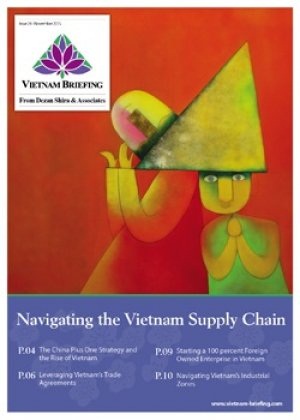Vietnam News Brief: Rice Exports, Government Workforce Reduction, and Gambling

Government eases restrictions for rice exporters
Vietnam’s Ministry of Industry and Trade (MOIT) approved an agreement easing restrictions on rice exporters. Under the previous regulation, the maximum number of rice exporters was capped at 150, who were all required to meet certain standards on storage and factories. Companies holding licenses to export rice were required to have at least one warehouse with a minimum capacity to store 5,000 tons of rice and a rice husking factory with a minimum capacity of 10 tons of paddy per hour. The facilities also had to be in planned areas.
Due to these restrictions, companies developing their own rice were forced to use intermediaries rather than having the ability to export directly. Companies with rice export certificates were required to export at least 10,000 tons of rice per year or 20,000 tons of rice in two years in case the first year quota was not reached. The abolition of the regulations is in line with the government’s plan of removing unsuitable laws as per the Investment Law 2014. The move has been lauded by rice export companies.
Government workforce reduction regulation issued
Vietnam’s Prime Minister issued Directive No 02/CT-TTg which makes it mandatory for each ministry, agency and locality to reduce the number of civil servants by 1.5 to 2 percent annually until 2021. Ministries that have not streamlined their workforce in 2016 will have to reduce civil servants by at least 3 percent by 2017. The new law also asked such ministries and agencies to implement automation for public non-business units. The hiring of new staff and opening of new agencies will also be restricted with considerations only in the healthcare and education sectors.
![]() RELATED: Dezan Shira & Associates’ Corporate Establishment Services
RELATED: Dezan Shira & Associates’ Corporate Establishment Services
The move is in line with the government’s plan to take strong measures to balance the budget as it struggles with a huge budget deficit. The government cut around 10,000 civil service jobs in the first half of 2016. Government officials have stated that the law will also make it easier to raise wages for the public sector as employees have complained of low incomes.
Locals to be allowed to gamble on trial basis
The Prime Minister of Vietnam announced on December 22, 2016 that Vietnamese citizens will be allowed to gamble at two local casinos – one on Phu Quoc Island, and the other in Van Don Special Economic Zone close to the Chinese border. However, a timeline on the trial run has still not been confirmed. Government officials have reiterated that a decree on gambling, which has been in the works since 2012, is still being developed. Sources say that as per the trial, locals would have to pay a daily entry fee of US$50, while a monthly pass would cost around US$1,100. Locals would have to be at least 21 years old with a minimum monthly income yet to be finalized.
Both gambling venues are still under development. Analysts have stated that Vietnam loses around US$800 million a year in tax revenue from locals that to go small casinos in Cambodia. The government is also working on relaxing restrictions on sports betting.
|
Asia Briefing Ltd. is a subsidiary of Dezan Shira & Associates. Dezan Shira is a specialist foreign direct investment practice, providing corporate establishment, business advisory, tax advisory and compliance, accounting, payroll, due diligence and financial review services to multinationals investing in China, Hong Kong, India, Vietnam, Singapore and the rest of ASEAN. For further information, please email vietnam@dezshira.com or visit www.dezshira.com. Stay up to date with the latest business and investment trends in Asia by subscribing to our complimentary update service featuring news, commentary and regulatory insight. |
![]()

Annual Audit and Compliance in Vietnam 2016
In this issue of Vietnam Briefing, we address pressing changes to audit procedures in 2016, and provide guidance on how to ensure that compliance tasks are completed in an efficient and effective manner. We highlight the continued convergence of VAS with IFRS, discuss the emergence of e-filing, and provide step-by-step instructions on audit and compliance procedures for Foreign Owned Enterprises (FOEs) as well as Representative Offices (ROs).
 Navigating the Vietnam Supply Chain
Navigating the Vietnam Supply Chain
In this edition of Vietnam Briefing, we discuss the advantages of the Vietnamese market over its regional competition and highlight where and how to implement successful investment projects. We examine tariff reduction schedules within the ACFTA and TPP, highlight considerations with regard to rules of origin, and outline the benefits of investing in Vietnam’s growing economic zones. Finally, we provide expert insight into the issues surrounding the creation of 100 percent Foreign Owned Enterprise in Vietnam.
 Tax, Accounting and Audit in Vietnam 2016 (2nd Edition)
Tax, Accounting and Audit in Vietnam 2016 (2nd Edition)
This edition of Tax, Accounting, and Audit in Vietnam, updated for 2016, offers a comprehensive overview of the major taxes foreign investors are likely to encounter when establishing or operating a business in Vietnam, as well as other tax-relevant obligations. This concise, detailed, yet pragmatic guide is ideal for CFOs, compliance officers and heads of accounting who must navigate Vietnam’s complex tax and accounting landscape in order to effectively manage and strategically plan their Vietnam operations.
- Previous Article Vietnam News Brief: Work Permits, Enterprise Registration, and Competition Cases
- Next Article An Introduction to Doing Business in Vietnam 2017 – New Publication from Dezan Shira & Associates









